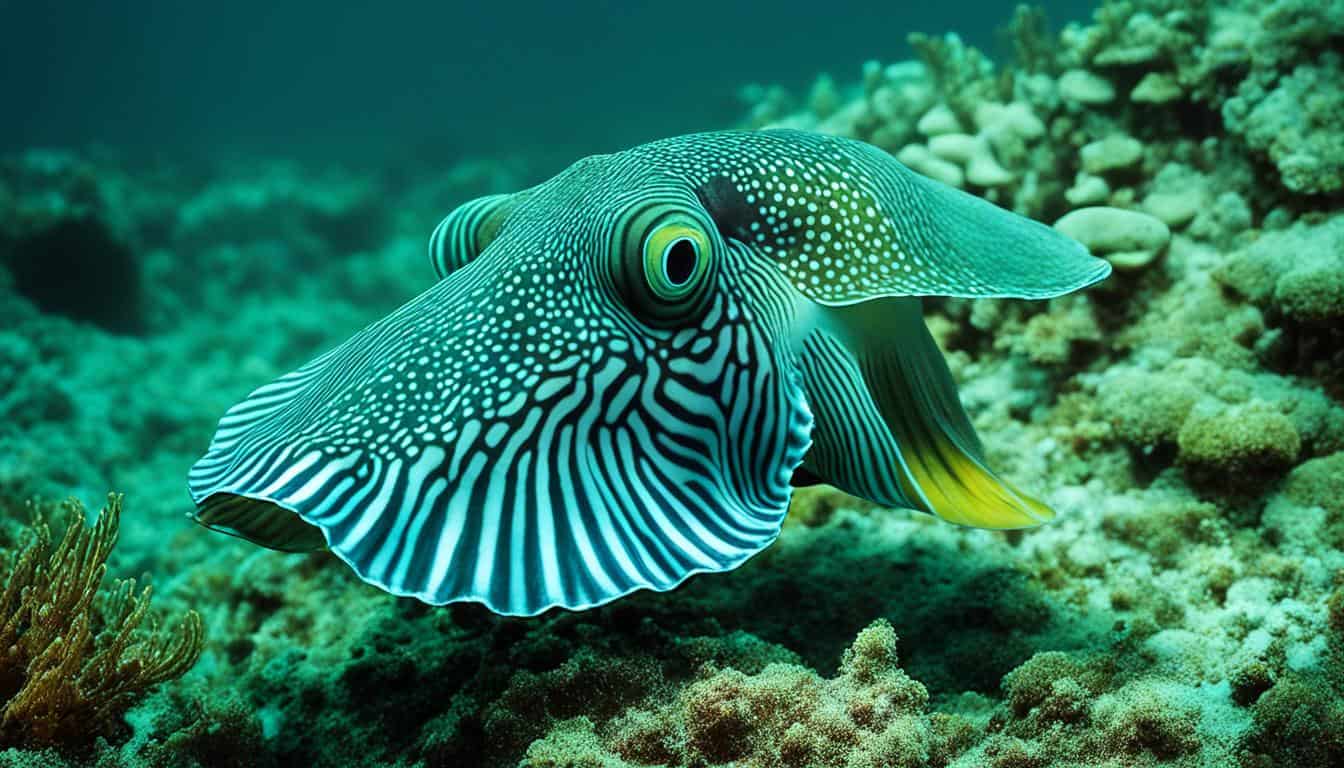Cuttlefish are fascinating marine animals known for their unique behaviors and beautiful looks. You might ask, are cuttlefish endangered? It’s important to know about the cuttlefish conservation status to understand the threats they face. Many species are declining due to human actions and environmental changes.
Knowing about endangered cuttlefish species is key to saving them. We need to work together to protect these smart creatures.
Understanding Cuttlefish Biology
Cuttlefish are fascinating creatures that belong to the cephalopod family. They are closely related to octopuses and squids. You might ask, what are cuttlefish? These invertebrates are known for their adaptability and intelligence. They have unique traits that make them stand out in the animal kingdom.
What are Cuttlefish?
Cuttlefish are not fish but are part of the cephalopod group. There are over 120 species of them in the world’s oceans. They usually live alone and can be as small as 1.7 inches or as big as 20 inches. Their size and hunting skills make them successful carnivores.
Characteristics and Appearance
Cuttlefish have many interesting features. They have eight arms and two longer tentacles. They are famous for changing color and texture. This is because they have about 10 million chromatophores in their skin.
Their appearance varies a lot between species. This makes them very intriguing to look at.
Intelligence and Behavior
Cuttlefish are very smart for invertebrates. They have great problem-solving skills and good memory. They can wait for what they want and solve problems like some mammals do.
They have interesting ways of mating and can change color and release ink. These behaviors help them avoid predators and survive.
Threats to Cuttlefish Populations
Cuttlefish are facing many threats that put their numbers at risk. It’s important to understand these challenges for conservation efforts. Overfishing and habitat destruction are major factors in the decline of cuttlefish populations worldwide.
Overfishing and Habitat Destruction
Overfishing is a big threat, especially for the common cuttlefish. It not only lowers their numbers but also harms marine ecosystems. Habitat destruction, from coastal development or industrial activities, makes things worse.
As their homes are destroyed or changed, cuttlefish find it hard to breed and feed.
Pollution and Ocean Acidification
Pollution from things like agricultural runoff and plastic waste harms cuttlefish. These pollutants are bad for their health. Ocean acidification, caused by more CO2 in the air, also threatens them.
This change in seawater chemistry makes it harder for cuttlefish to reproduce and grow. It greatly affects their population.
Predation and Natural Enemies
Cuttlefish also face threats from natural predators like dolphins, sharks, and big fish. While being eaten is part of nature, it’s harder for them when their homes are destroyed. This shows how vulnerable cuttlefish are to both natural and human threats.
Are cuttlefish endangered?
The conservation status of cuttlefish is crucial in marine biology. Many species face threats that affect their survival. Knowing about their classification and challenges can help us all support their conservation.
Cuttlefish Conservation Status Overview
Most cuttlefish are listed as Least Concern or Data Deficient by the IUCN. However, some are endangered. The giant Australian cuttlefish and the common cuttlefish are especially vulnerable. By understanding their needs, we can help protect them.
Species at Risk
The common cuttlefish was recently reclassified due to overfishing. This change shows how human actions impact endangered species. The giant cuttlefish is not endangered now, but it still needs our attention. Knowing about these species helps us make better conservation plans.

| Species | Conservation Status | Threats |
|---|---|---|
| Giant Australian Cuttlefish | Vulnerable | Overfishing, habitat loss |
| Common Cuttlefish | Endangered | Overfishing, climate change |
| European Cuttlefish | Least Concern | Pollution, habitat degradation |
Cuttlefish Conservation Efforts
Across the globe, many groups work to protect cuttlefish. They play a key role in keeping these creatures safe. This ensures they can live in their natural homes.
Marine Conservation Initiatives
Many projects focus on saving cuttlefish. Restoring their habitats is crucial. It helps cuttlefish have a good place to live.
Rules on fishing are also important. They protect marine life and help manage resources well. Working together, researchers, groups, and fisheries make better conservation plans.
Importance of Sustainable Practices
Sustainable ways are key to saving endangered cuttlefish. Fishing responsibly keeps their numbers stable. Teaching fishermen about cuttlefish helps them support their conservation.
Knowing the harm of bad practices can lead to fewer cuttlefish. This is a big concern for these unique sea creatures.
Community Involvement in Conservation
Getting local communities involved helps protect cuttlefish. Programs teach people and encourage them to help. This tackles issues like overfishing and harming their homes.
The Role of Cuttlefish in Marine Ecosystems
Cuttlefish are key players in the ocean, acting as both hunters and hunted. They keep the numbers of smaller sea creatures in check, which is good for the ocean’s balance. This helps keep the food web healthy.
They also play a big part in recycling nutrients in the sea. As food for bigger animals like sharks and seals, cuttlefish are vital. Losing them could disrupt the entire food chain.
We need to protect cuttlefish because they’re so important to the ocean. Their numbers are dropping due to overfishing and habitat loss. Saving cuttlefish is key to keeping our oceans healthy and strong.
FAQ
Are cuttlefish endangered?
Not all cuttlefish are endangered, but some, like the common cuttlefish, are. This is due to overfishing and habitat loss. It’s crucial to understand their conservation status to protect them.
What are cuttlefish?
Cuttlefish are fascinating sea creatures. They belong to the Sepiida order and are related to octopuses and squids. They can change color and are very intelligent.
What are the characteristics and appearance of cuttlefish?
Cuttlefish have unique bodies with eight arms and two long tentacles. They range in size from 1.7 to 20 inches. They’re known for their ability to blend in and change their skin texture.
How intelligent are cuttlefish?
Cuttlefish are very intelligent. They have great memory and problem-solving skills. They’re considered smart because of their brain size and complex behaviors, like their mating rituals.
What threats do cuttlefish populations face?
Cuttlefish face threats from overfishing, habitat loss, pollution, and ocean acidification. These issues harm their populations and contribute to their decline.
What is the impact of pollution on cuttlefish?
Pollution harms cuttlefish by contaminating their homes with chemicals and plastic. This hurts their health and survival chances. It also affects their ability to reproduce and overall well-being.
Who are the natural predators of cuttlefish?
Dolphins, sharks, large fish, and other cuttlefish prey on cuttlefish. This predation can greatly impact their numbers, especially in small habitats.
What is the current conservation status of cuttlefish?
Cuttlefish conservation status varies by species. While many are safe, the common and giant Australian cuttlefish are at risk. If not managed well, they could become endangered.
What conservation efforts are in place for cuttlefish?
Conservation efforts include restoring habitats and setting rules for fishing. Researchers and groups work together to protect cuttlefish.
Why are sustainable fishing practices important for cuttlefish?
Sustainable fishing helps protect endangered cuttlefish and marine ecosystems. It ensures their numbers stay healthy and supports the ocean’s balance.
How can local communities be involved in cuttlefish conservation?
Local communities can help protect cuttlefish through education and action. Programs and initiatives led by the community can fight overfishing and habitat destruction.
What role do cuttlefish play in marine ecosystems?
Cuttlefish are key to marine ecosystems. They control the populations of smaller sea creatures. Their presence is vital for a healthy ocean.







